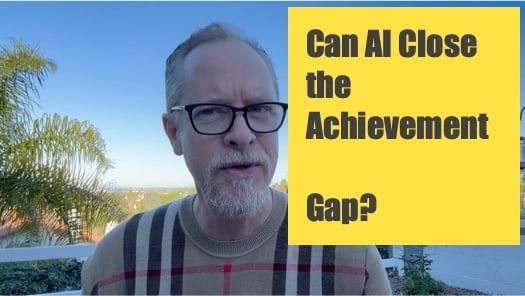1 min read
Beyond Plagiarism: The Untapped Potential of AI in Closing the Achievement Gap
Damon Torgerson : Feb 15, 2024 7:00:00 AM

Dr. Mike Swize, former Superintendent of Palm Springs Unified School District, addressed the prevalent concerns among classroom teachers regarding the use of Artificial Intelligence (AI) in education, particularly focusing on the fear of increased cheating and plagiarism among students.
This concern was highlighted in a recent Forbes magazine survey, where 65% of classroom teachers identified student cheating as their top worry with the incorporation of AI in teaching environments. Dr. Swize emphasizes that while cheating and plagiarism have always been concerns in education, focusing solely on these issues overlooks the transformative potential of AI in the classroom.
He argues that AI holds the promise—not yet fully realized—to significantly narrow the achievement gap in K-12 education. By harnessing AI's capabilities, educators can tailor learning experiences to meet the diverse needs of marginalized student groups and adapt lessons to cater to individual student requirements.
Dr. Swize advocates for viewing AI as a powerful tool for creative construction, enhancing communication, and providing broader access to learning resources for all students. He encourages educators and stakeholders in the public K-12 education sector to recognize and explore the immense possibilities AI offers for fostering equitable learning environments and effectively addressing the achievement gap.
Transcript
In a recently published survey by Forbes magazine, classroom teachers said that their biggest concern about AI in the classroom had to do with students cheating or plagiarizing content.
I think that's fascinating. Sixty five percent. So the top concern of classroom teachers is that students will cheat.
As we know, teachers have always been worried about that, kids looking at each other's papers or copying off of each other.
But I think with artificial intelligence, if our concern is only around plagiarism and cheating, I think we're missing an opportunity.
AI in the classroom has the potential, not yet the ability, but the potential to help us close the achievement gap.
To differentiate learning for some of our marginalized student groups, and to adapt lessons to meet student specific needs.
We should be looking at artificial intelligence as a tool of creative construction and of increasing communication and access for all of our students.
Just wanted to share that fascinating statistic from Forbes. And again, to encourage all of my friends in public K12, to think about artificial intelligence and its incredible potential for creative construction and helping us to close the achievement gap.
Earn Continuing Education Units with Alludo & Fresno Pacific University
Earn Continuing Education Units from Fresno Pacific University!


